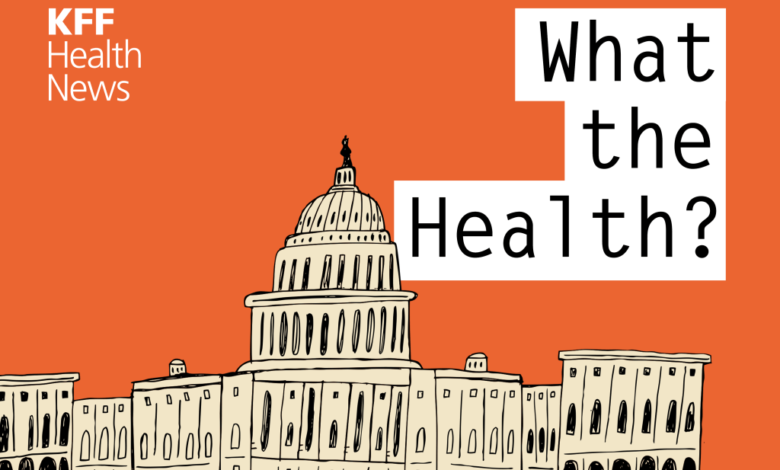KFF Health News’ ‘What the Health?’: Alabama Court Rules Embryos Are Children. What Now?

The Host
The Alabama Supreme Court’s groundbreaking ruling last week that frozen embryos have legal rights as people has touched off a national debate about the potential fallout of the “personhood” movement. Already the University of Alabama-Birmingham has paused its in vitro fertilization program while it determines the ongoing legality of a process that has become increasingly common for those wishing to start a family.
Meanwhile, former President Donald Trump is reportedly leaning toward endorsing a national, 16-week abortion ban. At the same time, former aides are planning a long agenda of reproductive health restrictions should Trump win a second term.
This week’s panelists are Julie Rovner of KFF Health News, Lauren Weber of The Washington Post, Rachana Pradhan of KFF Health News, and Victoria Knight of Axios.
Panelists
Among the takeaways from this week’s episode:
- The Alabama Supreme Court’s decision on embryonic personhood could have wide-ranging implications beyond reproductive health care, with potential implications for tax deductions, child support payments, criminal law, and much more.
- Donald Trump is considering a national abortion ban at 16 weeks of gestation, according to recent reports. It is unclear whether such a ban would go far enough to please his conservative supporters, but it would be far enough to give Democrats ammunition to campaign on it. And some are looking into using a 19th-century anti-smut law, the Comstock Act, to implement a national ban under a new Trump presidency — no action from Congress necessary.
- New reporting from KFF Health News draws on many interviews with clinicians at Catholic hospitals about how the Roman Catholic Church’s directives dictate the care they may offer patients, especially in reproductive health. It also draws attention to the vast number of religiously affiliated hospitals and the fact that, for many women, a Catholic hospital may be their only option.
- Questions about President Joe Biden’s cognitive health are drawing attention to ageism in politics — as well as in American life, with fewer people taking precautions against the covid-19 virus even as it remains a serious threat to vulnerable people, especially the elderly. The mental fitness of the nation’s leaders is a valid, relevant question for many voters, though the questions are also fueled by frustration with a political system in which many offices are held by older people who have been around a long time.
Email Sign-Up
Subscribe to KFF Health News’ free Morning Briefing.
Plus, for “extra credit” the panelists suggest health policy stories they read this week that they think you should read, too:
Julie Rovner: Stat’s “New CMS Rules Will Throttle Access Researchers Need to Medicare, Medicaid Data,” by Rachel M. Werner.
Lauren Weber: The Washington Post’s “They Take Kratom to Ease Pain or Anxiety. Sometimes, Death Follows,” by David Ovalle.
Rachana Pradhan: Politico’s “Red States Hopeful for a 2nd Trump Term Prepare to Curtail Medicaid,” by Megan Messerly.
Victoria Knight: ProPublica’s “The Year After a Denied Abortion,” by Stacy Kranitz and Kavitha Surana.
Also mentioned on this week’s podcast:
- The New York Times’ “Trump Privately Expresses Support for a 16-Week Abortion Ban,” by Maggie Haberman, Jonathan Swan, and Lisa Lerer.
- The New York Times’ “Trump Allies Plan New Sweeping Abortion Restrictions,” by Lisa Lerer and Elizabeth Dias.
- Politico’s “Trump Allies Prepare to Infuse ‘Christian Nationalism’ in Second Administration,” by Alexander Ward and Heidi Przybyla.
- KFF Health News’ “The Powerful Constraints on Medical Care in Catholic Hospitals Across America,” by Rachana Pradhan and Hannah Recht.
- The Washington Post’s “Tax Records Reveal the Lucrative World of Covid Misinformation,” by Lauren Weber.
- KFF Health News’ “Do We Simply Not Care About Old People?” by Judith Graham.
- Stat’s “A Neuropsychologist Clarifies Science on Aging and Memory in Wake of Biden Special Counsel Report,” by Annalisa Merelli.
Credits
To hear all our podcasts, click here.
And subscribe to KFF Health News’ “What the Health?” on Spotify, Apple Podcasts, Pocket Casts, or wherever you listen to podcasts.



